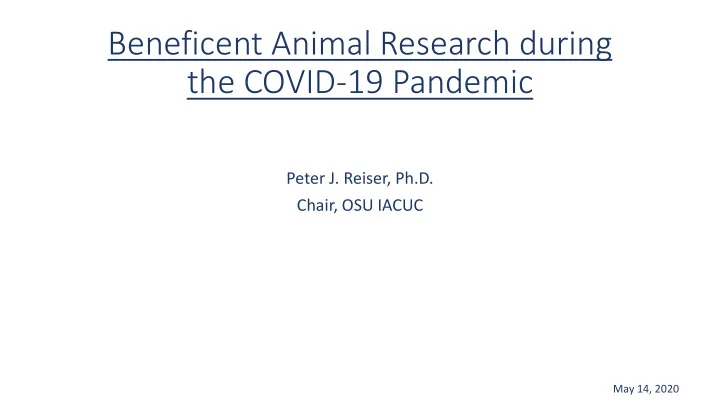

Beneficent Animal Research during the COVID-19 Pandemic Peter J. Reiser, Ph.D. Chair, OSU IACUC May 14, 2020
Beneficent Animal Research Several changes are in-place during the state of emergency that ensure the beneficent use of animals. These changes are directed toward (1) ensuring the welfare of animals on studies and (2) ensuring the safety of individuals in animal facilities. These are two major responsibilities of the animal care and use program at OSU at all times, and changes needed to be implemented during the pandemic to be able to fulfill these. These responsibilities are normally shared by (1) individuals who use animals in research and teaching, (2) the Institutional Animal Care and Use Committee, or “IACUC”, and (3) University Laboratory Animal Resources, or “ULAR”, to maintain an accredited program. Protocol Study Team: PI Postdoctoral associates Graduate students Undergraduate students Lab volunteers Lab manager Shared responsibilities for animal welfare University IACUC Laboratory Animal Resources
Beneficent Animal Research Regarding the welfare of animals, the following changes have been implemented: • Dr. Valerie Bergdall, Director of ULAR and the OSU Attending Veterinarian, has managed the ULAR staff who provide daily care and monitoring animals so that adequate levels have been, and continue to be, maintained. Dr. Bergdall recently indicated that no major problems in the animal care program have been encountered. • No new studies involving animals can be initiated to minimize the number of individuals performing animal-related activities and follow-up monitoring, except for critical research as defined by the OSU Office of Research. Critical research includes projects that are focused on COVID-19. No new animals should be enrolled into ongoing, non-critical studies. Monitoring of animals can occur but this must be approved at the college-level and in coordination with ULAR staff.
Beneficent Animal Research • No new animal orders are being approved, unless the orders are for what is considered to be critical research, such as that related to the pandemic. This reduces the workload on ULAR staff and allows the staff to focus on a smaller number of animals. So far, there has been a decrease in the number of animals in vivaria of about 10%. • Related to this, ULAR staff are available to provide monitoring of animals, as described in approved IACUC protocols, such as post-surgical On hold, unless critical. monitoring, if study team members cannot provide this monitoring. Arrangements for this must be made with ULAR.
Beneficent Animal Research • Activities that are related to maintaining valuable animal lines are allowed but these must be approved at the college- level. These include setting up breeding cages and tissue sampling for genotyping purposes. Maintaining existing cell lines is also allowed but that is not overseen by the IACUC. • There was a webinar that was offered last week that focused primarily on understanding and following IACUC policies related to animal surgery. This was prompted by results of semi-annual facility inspections and discussion with study team members of IACUC protocol. It was not specifically related to the pandemic but it related directly to today’s webinar which is focused on maintaining research integrity. It was offered at a time when many individuals were working remotely and, hopefully, had an opportunity to adjust their schedules to be able to participate. This webinar was recorded and is available to others for viewing. Individuals can use the link below or contact the IACUC office for information. IACUC Rodent Survival Surgery Policy Workshop: How to Stay Compliant POSTED: APRIL 15, 2020 https://orrp.osu.edu/2020/04/15/iacuc-rodent-survival-surgery-policy-how-to-stay-compliant/
Beneficent Animal Research • If the IACUC receives reports or questions about specific activities from ULAR staff or anyone else, the office staff and committee members act accordingly, following formalized office procedures. During the pandemic there has been some, but very limited, activity related to this, indicating that adequate oversight is being provided and efforts to ensure animal welfare are in place.
Beneficent Animal Research • The Institutional Biosafety Committee has been meeting twice weekly to evaluate and approve pandemic-related activities. This is in addition to the IBC regular monthly meetings. IBC approval must be granted before IACUC protocols and amendments are approved.
Beneficent Animal Research The semi-annual facility inspections that are conducted by the IACUC are on-hold and plans to resume these when we are allowed to return to campus are being made.
Beneficent Animal Research With respect to ensuring the safety of individuals monitoring or working with animals, many of the above changes impact this very important responsibility and the following changes have been implemented to further promote safety: • The ULAR staff were initially working on split-shifts to promote physical distancing and now are working on staggered, partially overlapping shifts. • As a consequence of the guidelines provided by the Office of Research regarding what is critical research and allowed to continue and the guidelines provided by ULAR, there has been a decrease of about 90% in the number of individuals entering vivaria. Therefore, many people are following the guidelines and this has promoted physical distancing. This allows ULAR staff to focus on the additional monitoring of animals that they are performing when study team members cannot do this. • Individuals who are approved to work in vivaria are asked to coordinate their time in the facilities with ULAR staff.
Beneficent Animal Research Overall, the assurance of animal welfare and the safety of individuals working with and caring for animals have been maintained, with careful considerations and implemented changes, during the pandemic, without any major issues. This success is due to the coordinated and cooperative activities by study team members, the IACUC and ULAR. This period highlights was is necessary to have an effective animal care and use program at all times.
Recommend
More recommend